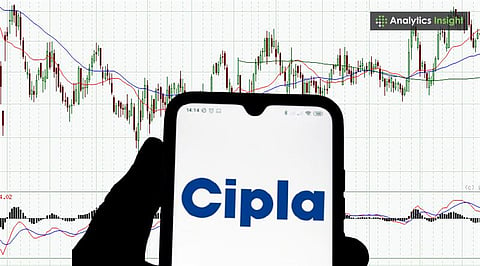

Cipla Share Price fell to around Rs. 1,492 after the US imposed 100% tariffs on patented drugs.
Strong quarterly earnings and low debt keep Cipla’s fundamentals solid.
Leadership changes and global policy risks may drive near-term stock volatility.
Cipla Ltd., one of India’s biggest pharmaceutical companies, is in focus today as its share price shows pressure from both global policy risks and domestic market reactions. On the stock exchanges, Cipla was last seen trading near Rs. 1,492, lower compared to the previous closing level. On the National Stock Exchange and Bombay Stock Exchange, the stock opened at around Rs. 1,495.60, while the earlier close was recorded at Rs. 1,509.70.
The decline of Cipla share price amounts to nearly 1.30 percent, falling by Rs. 19.60 in intraday trade. Trading volumes have also been heavy, with more than 12.7 lakh shares changing hands. The stock currently holds a 52-week high of Rs. 1,702.05 and a 52-week low of Rs. 1,335.00, showing that the present price is closer to the lower end of this range.
Despite today’s fall, Cipla’s fundamentals remain strong. The company is trading at a price-to-earnings ratio of 22.5 times, which reflects its valuation compared to earnings. Book value per share is around Rs. 386, giving investors a sense of the asset base relative to the price. The dividend yield stands at approximately 1.06 percent, providing steady income to long-term shareholders.
On the profitability front, Cipla’s return on equity for the year ended March 2025 is nearly 16.9 percent. In addition, the company has carried a minuscule debt-to-equity ratio, indicating its balance sheet is virtually unencumbered with leverage. These robust financial statistics show that Cipla is still running well at an operational level, even when headwinds rattle market sentiment.
The immediate reason behind today’s decline in the price of Cipla shares is a major global policy announcement. The United States has introduced a 100 percent import tariff on patented and branded drugs, effective from October 1. This has created strong ripples across the Indian pharmaceutical sector, as several companies, including Cipla, depend on exports to the US market.
Although Cipla’s reliance on patented drugs in the US is smaller compared to peers like Sun Pharma, the uncertainty around profitability and market access has weighed on the stock price. Investors are worried about future export margins and whether such tariffs could hurt earnings growth. As a result, pharma counters across the board, including Cipla, have seen declines of up to 5 percent in the past sessions.
While external risks have unsettled markets, Cipla’s recent earnings continue to show strength. In the October to December quarter of fiscal year 2025, the company reported a 49 percent jump in net profit. This performance came mainly from robust domestic demand, which helped offset weaker sales in North America.
For the January to March quarter, or Q4 FY25, Cipla recorded a 30 percent year-on-year rise in net profit, reaching Rs. 1,222 crores. Revenue during this period rose by 8.5 percent. These results highlight that the company has been able to sustain momentum in its core businesses and maintain steady growth despite headwinds from overseas markets.
In recent months, there has been speculation about a leadership transition, with reports that Cipla’s CEO, Umang Vohra, may step down. Any change in leadership for a company of this size creates uncertainty, as markets closely track shifts in strategic direction.
On the business expansion side, Cipla has also taken steps to strengthen its portfolio. It received rights to commercialize Vonoprazan, a gastro drug, in India. This partnership with Takeda indicates Cipla’s efforts to expand beyond traditional generics and build stronger positions in specialty medicines.
Last year, the promoter group had proposed selling a 2.53 percent stake through a block deal, valued at nearly Rs. 26,400 crores. While such sales sometimes raise concerns about promoter confidence, there has been no immediate adverse impact on operations or governance. The market, however, continues to track these developments as they reflect long-term ownership trends.
Also Read: Impact of Trump Tariff on Indian Economy?
The present weakness of Cipla share price is more connected to global events rather than internal problems. Strong quarterly results, low debt, and steady margins all indicate that the company is well-positioned to handle external pressures. At the same time, high valuations mean that investors will expect consistent growth and earnings resilience.
Brokerages have shown confidence in the stock in recent months, even raising price targets after strong quarterly numbers. Some analysts expect Cipla’s shares to move towards Rs. 1,875 in the medium term, supported by domestic strength and new product launches.
Still, much depends on how the US tariff decision plays out and whether leadership changes bring fresh strategic challenges. For now, Cipla remains fundamentally sound, but market volatility may persist in the short term as investors balance risks with growth opportunities.
Join our WhatsApp Channel to get the latest news, exclusives and videos on WhatsApp
_____________
Disclaimer: Analytics Insight does not provide financial advice or guidance on cryptocurrencies and stocks. Also note that the cryptocurrencies mentioned/listed on the website could potentially be scams, i.e. designed to induce you to invest financial resources that may be lost forever and not be recoverable once investments are made. This article is provided for informational purposes and does not constitute investment advice. You are responsible for conducting your own research (DYOR) before making any investments. Read more about the financial risks involved here.
